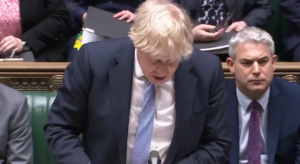The prime minister will effectively declare the end of the pandemic in two weeks, scrapping compulsory isolation for people with Covid-19 and starting the winding-down of free tests.
Boris Johnson hopes to bring forward the end of all remaining restrictions to later this month, meaning that people who test positive for the coronavirus in England will be free to decide whether to isolate and for how long.
The move will be part of a “strategy for living with Covid”, to be published on February 21, which is also expected to set out how the country’s testing network will be scaled back. This is not expected to begin immediately, but from the spring there will be a reduction in the number of local testing centres, along with a reduction in the availability of free lateral flow tests.
Free tests are likely to be gradually restricted to key workers, schools, hospitals, care homes and other higher risk settings. The move was immediately welcomed by lockdown-sceptic Conservatives in a sign that it will help Johnson to shore up his leadership.
He was accused of making the decision for political reasons, with the Scottish government signalling that it was not backed by evidence.
It is understood that the Scientific Advisory Group for Emergencies has not issued advice on ending remaining restrictions, although there is widespread acceptance that an end to restrictions has to occur eventually.
One British scientific adviser said that it was “possible to make the right decision for the wrong reasons”, with questions remaining about whether restrictions should be scrapped with cases still so high.
Cases and hospital admissions have continued to fall despite a return to normality in schools, offices and hospitality. Daily cases have fallen 60 per cent in the past month, with 68,214 reported yesterday, while admissions have fallen by more than a third.
Johnson told the Commons: “Provided the current encouraging trends in the data continue, it is my expectation that we will be able to end the last domestic restrictions . . . a full month early.” He said last month that the isolation requirements would end on March 24. Lord Frost, who quit the cabinet over Covid measures in December, said: “I hope the government will make clear we will not go down the road of coercive lockdowns ever again.”
Professor Peter Openshaw, a government scientific adviser, said that it would be “wholly wrong” to view the pandemic as “in any way over”. He told the BBC: “We don’t know what’s around the corner, there could be another variant, perhaps based on Delta or something else with higher pathogenicity, which could come back to bite us any time, and I’m pretty sure that next winter we’re going to see it back.”























0 Comments